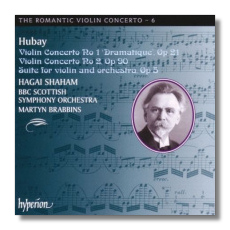
The Internet's Premier Classical Music Source
Related Links
- Hubay Reviews
- Latest Reviews
- More Reviews
-
By Composer
-
Collections
DVD & Blu-ray
Books
Concert Reviews
Articles/Interviews
Software
Audio
Search Amazon
Recommended Links
Site News
 CD Review
CD Review
Jenő Hubay

The Romantic Violin Concerto - Volume 6
- Violin Concerto #1 "Dramatique", Op. 21
- Violin Concerto #2, Op. 90
- Suite for Violin & Orchestra, Op. 5
Hagai Shaham, violin
BBC Scottish Symphony Orchestra/Martyn Brabbins
Hyperion CDA67498 73m DDD
Born as Jenö Huber in Budapest in September in 1858 into a musical family, today he is best known for his violin showpieces other than the rest of his large output which includes 4 symphonies, eight operas and four violin concertos, not to mention the numerous chamber pieces and his educational works.
In Hungary, Hubay is considered the father of the 'Hungarian Violin School' and among the list of his protégés we find such virtuosi as Joseph Szigeti, Sándor Végh and Ilona Feher who taught the soloist on this recording. His precocious talent soon came to the fore, as when aged 11 he performed a Viotti concerto. Four years later he moved to Berlin to study with Joachim and between 1876 and 1878, he studied composition with the great Liszt, an experience that was to serve him for the rest of his life. In 1878, he met Vieuxtemps in Paris and apart from the professional advice that Hubay received, they became close friends.
Throughout his career, he held many prestigious positions both at the Brussels and Budapest Conservatoires and for 50 years he played a leading role in Hungarian music. His receiving of many honours and doctorates abroad did not help his cause, and by the time the socialists came to power after the Second World War, his contribution to Hungary's cultural life was almost forgotten. Hubay died in 1937 aged 79.
The three works on this disc betray Hubay's debt to Brahms and Liszt, but their extravagantly virtuosic style is very much his own. Passionate, rhapsodic and full of gypsy-like fire, they make compelling and exciting listening. Shaham's playing reveals his love and knowledge of Hubay's scores with performances of supreme artistry and dexterity, and in his hands these works are projected in their true light. Brabbins and the BBC Scottish Symphony Orchestra offer sympathetic and detailed support.
Copyright © 2006, Gerald Fenech




















